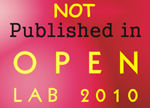Neuroexistentialism: A Brain in Search of Meaning
“Neuroexistentialism” is the angst that some humans feel upon realizing that the mind and spirit have an entirely physical basis. At a personal level I don't understand all the hubbub, because I accepted that mind = brain when I entered graduate school to study neuroscience. But for others:
“Coming to terms with the neural basis of who we are can be very unnerving. It has been called “neuroexistentialism”, which really captures the essence of it. We’re not in the habit of thinking about ourselves that way” (Churchland, 2013).
It's very 2013.
Neuroexistentialism is also the title of a forthcoming volume of essays edited by Caruso and Flanagan. In their introductory chapter, Flanagan and Caruso define this philosophical variant in the progression of existentialisms to the present third-wave:
“There are three kinds of existentialism that respond to three different kinds of grounding projects—grounding in God’s nature, in a shared vision of the collective good, or in science. The first-wave existentialism of Kierkegaard, Dostoevsky, and Nietzsche expressed anxiety about the idea that meaning and morals are made secure because of God’s omniscience and good will. The second-wave existentialism of Sartre, Camus, and de Beauvoir, was a post-holocaust response to the idea that some uplifting secular vision of the common good might serve as a foundation. Today, there is a third-wave existentialism, neuroexistentialism, which expresses the anxiety that even as science yields the truth about human nature it also disenchants. The theory of evolution together with advances in neuroscience remove the last vestiges of an immaterial soul or self that can know the nature of what is really true, good, and beautiful.”
But I don't understand why the neuroscientific view must be so disenchanting. (But then again I'm a neuroscientist.) I knew fellow students who went to church yet easily reconciled their cell culture day jobs with their religious beliefs.
Professor Patricia Churchland is the best at explaining the “Don't Worry, Be Happy” response to neuroexistential terror:
Q - Some might say the idea that you are just your brain makes life bleak, unforgiving and ultimately futile. How do you respond to that?
A - It’s not at all bleak. I don’t see how the existence of a god or a soul confers any meaning on my life. How does that work, exactly? Nobody has ever given an adequate answer. My life is meaningful because I have family, meaningful work, because I love to play, I have dogs, I love to dig in the garden. That’s what makes my life meaningful, and I think that’s true for most people.
The Scope of Neuroexistentialsim
In brief, it's about free will, morality, meaning, and purpose. And of course neuroscience.
Back to my puzzlement about who suffers from a modern-day ailment caused by science spoilers. I found the below sentence to be both condescending and hyperbolic (Flanagan and Caruso):
But for most ordinary folk and many members of the nonscientific academy, the idea that humans are animal and that the mind is the brain is destabilizing and disenchanting, quite possibly nauseating, a source of dread, fear and trembling, sickness unto death even.
Perhaps the authors overascribe the illness and exaggerate the depth of ennui experienced by “most ordinary folk” who are too busy to grapple with the scientific implications of social neuroscience.
Honestly, I don't mean to be overly snarky but right now I'm grappling with Survival and Grief, and with second-wave existential crises caused by crazed leaders with bad hair who wave around their phallic symbols of nuclear destruction, and with persisting racism that divides the country, and with the hypocrisy of anti-immigration Christians, and with a future of toxic air and coastal regions underwater. Maybe what I'm experiencing is actually fourth-wave existentialism...
Medicating Neuroexistential Angst
If neuroexistentialism is a narrow form of generalized anxiety or even panic, can't we use our scientific knowledge to sooth these troubled brains? Why not apply psychopharmacological principles (and/or psychotherapy) to calm the fearful and trembling mind? We have already presupposed that mind = brain (which brought us “sickness unto death even”), and that medications can alter brain function in psychiatric disorders.
But this is not the correct way forward (see Flanagan and Caruso).
“...Are there naturalistic resources that can quell the anxiety produced by the ascendancy of the scientific image generally, and specifically, the picture that comes from combining neo-Darwinism with neuroscience, which produces the new and nerve-wracking anxiety associated with neuroexistentialism?
One promising approach is to pursue a kind of descriptive-normative inquiry into the causes and conditions of flourishing for material beings living in a material world, whose self-understanding includes the idea that such a world is the only kind of world that there is and thus that the meaning and significance of their lives, if there is any, must be found in such a world. We can call such an inquiry eudaimonics (Flanagan 2007, 2009).”
So the solution to third-wave existentialism is positive psychology (as opposed to despair).1
Footnote
1 Despair:
What sets the existentialist notion of despair apart from the conventional definition is that existentialist despair is a state one is in even when he isn't overtly in despair. So long as a person's identity depends on qualities that can crumble, he is considered to be in perpetual despair. And as there is, in Sartrean terms, no human essence found in conventional reality on which to constitute the individual's sense of identity, despair is a universal human condition.
Further Reading
Existential Neuroscience: a field in search of meaning
Earlier in 2013, the field of Existential Neuroscience (distinct from Neuroexistentialism) took the journal SCAN by storm, with neuroimaging studies focused on terror management theory (which describes how we deal with the inevitability of death). At the time,
I asked:
But what is Existential Neuroscience, exactly? A group of French intellectuals discussing brain research in a cafe while smoking and sipping espresso? An authentic neuroscience of utter freedom that embraces a state of perpetual despair1 over the meaninglessness of existence? Or independent groups of German-speaking neuroscientists who scan subjects while they ponder death?
Subscribe to Post Comments [Atom]


















